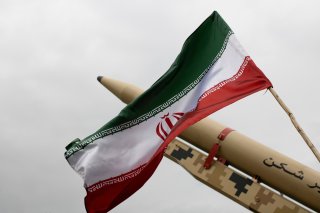U.S. Needs a Full Rapprochement with Iran
Washington is now in a position in which it will have no meaningful economic or even diplomatic ties with Tehran, even as it approaches nuclear-power status.
There are multiple signs that Joe Biden’s administration remains interested in reviving the Joint Comprehensive Plan of Action (JCPOA) concerning Iran’s nuclear program. That agreement, signed in 2015 between Tehran and the five permanent members of the United Nations Security Council, plus Germany (P5+1), lasted until President Donald Trump announced Washington’s withdrawal from the accord in May 2018.
With the return to a more conventional American role in world affairs under Biden, there were cautious hopes early on that the United States, the P5+1 powers, and Iran might restart the agreement. Such speculation has surfaced periodically, including an especially optimistic flurry in January 2022. Those expectations proved to be premature. Nevertheless, some prominent American analysts continue to tout prospects for a diplomatic breakthrough, even though matters remain tense and delicate. Optimists now cite the modest prisoner exchange agreement between Washington and Tehran in September 2023, which freed five Americans, as a development that may facilitate significant progress on negotiations regarding the nuclear agreement.
Even if the accord were revived, though, it is only one outcome among many that will be required to materially reduce tensions with Iran. Indeed, one could argue that the intense focus on the nuclear issue is far too narrow. The seemingly never-ending crisis in bilateral relations will not end or even ease significantly until both governments address broader issues and work toward a comprehensive rapprochement.
It is important to remember that the unrelenting hostility between Washington and Tehran began long before the nuclear issue became prominent. It reached a critical level following the 1979 Islamic Revolution and the subsequent seizure of the U.S. embassy in Tehran. Infuriated Americans watched as blindfolded diplomats were paraded before television cameras and held hostage for 444 days. The United States retaliated by imposing an array of economic sanctions that quickly exacerbated Iran’s economic decline and created mounting hardships for the Iranian people. Additional brutal sanctions have followed over the decades.
Many Americans, especially those in the diplomatic and military establishments, have seemingly never forgiven Iran for the hostage episode. Tehran’s consistent support for virtually any faction in the Middle East and elsewhere that sought to undermine Washington’s hegemony intensified the estrangement. The United States committed its own provocations, virtually surrounding Iran with military forces and bases.
U.S. leaders need to move beyond their perpetual, increasingly counterproductive grudge against Tehran. Restoring the JCPOA would be a good start, but both Washington and Tehran must take steps to reestablish a more normal diplomatic and economic relationship on all fronts. That means restoring diplomatic ties and conducting far-reaching negotiations to end the punishing sanctions regime. The president can revive formal diplomatic relations without congressional action, and he has limited, unilateral authority to lift some sanctions, as Barack Obama did after the original JCPOA went into effect. But a more extensive rescission of sanctions requires congressional approval.
Tehran would have to concede significant concessions to stand any reasonable chance of gaining congressional cooperation in sanctions relief. Those likely would include ending the sale of missiles and drones to Russia, which Moscow is using to prosecute its war in Ukraine, and a commitment from the Iranian government to distance itself from the Taliban and other militant movements.
Unfortunately, signs of flexibility on Washington’s part are meager. Indeed, some recent actions suggest utterly counterproductive vindictiveness. The Biden administration’s reaction to the recent peace accord between Iran and Saudi Arabia, which restored bilateral diplomatic relations and paved the way for Syria’s readmission to the Arab League, is a case in point. Instead of graciously endorsing a measure that significantly reduced regional tensions, Washington responded with petty obstructionism, imposing new sanctions on Iran’s ally, Syria. U.S. leaders were likely caught flat-footed when China helped mediate the Iranian-Saudi accord. However, the Biden administration had no one but itself to blame for that embarrassment. More adept, flexible diplomacy might have enabled the United States to play the role of peacemaker.
The sterility of U.S. policy toward Iran is similar to its bankrupt policy toward North Korea. In both cases, U.S. officials are obsessed with the nuclear issue to the exclusion of nearly all other considerations. Over the past three decades, Washington's demands that Pyongyang abandon its nuclear program and return the country to nuclear virginity have gone nowhere. The United States is now in a position in which it will have no meaningful economic or even diplomatic ties with a country that already has a small nuclear arsenal and is rapidly developing a long-range ballistic missile system to deliver those warheads.
Unless U.S. policy changes, America may eventually end up in an equally dangerous non-relationship with Iran. Tehran has not yet built nuclear weapons, and a return to the JCPOA would likely forestall that possibility for a few years. However, if Washington does not alter its policy and pursue a normal relationship with Iran across the board, the eventual danger of a North Korea-style scenario will grow. The question is whether the Biden administration and Congress have the wisdom and vision to avoid such a tragic outcome.
Ted Galen Carpenter is a contributing editor at The National Interest, a senior fellow at the Randolph Bourne Institute, and a senior fellow at the Libertarian Institute. He also held various senior policy posts during a 37-year career at the Cato Institute. Dr. Carpenter is the author of 13 books and more than 1,200 articles on international affairs. His latest book is Unreliable Watchdog: The News Media and U.S. Foreign Policy (2022).
Image: Shutterstock.

